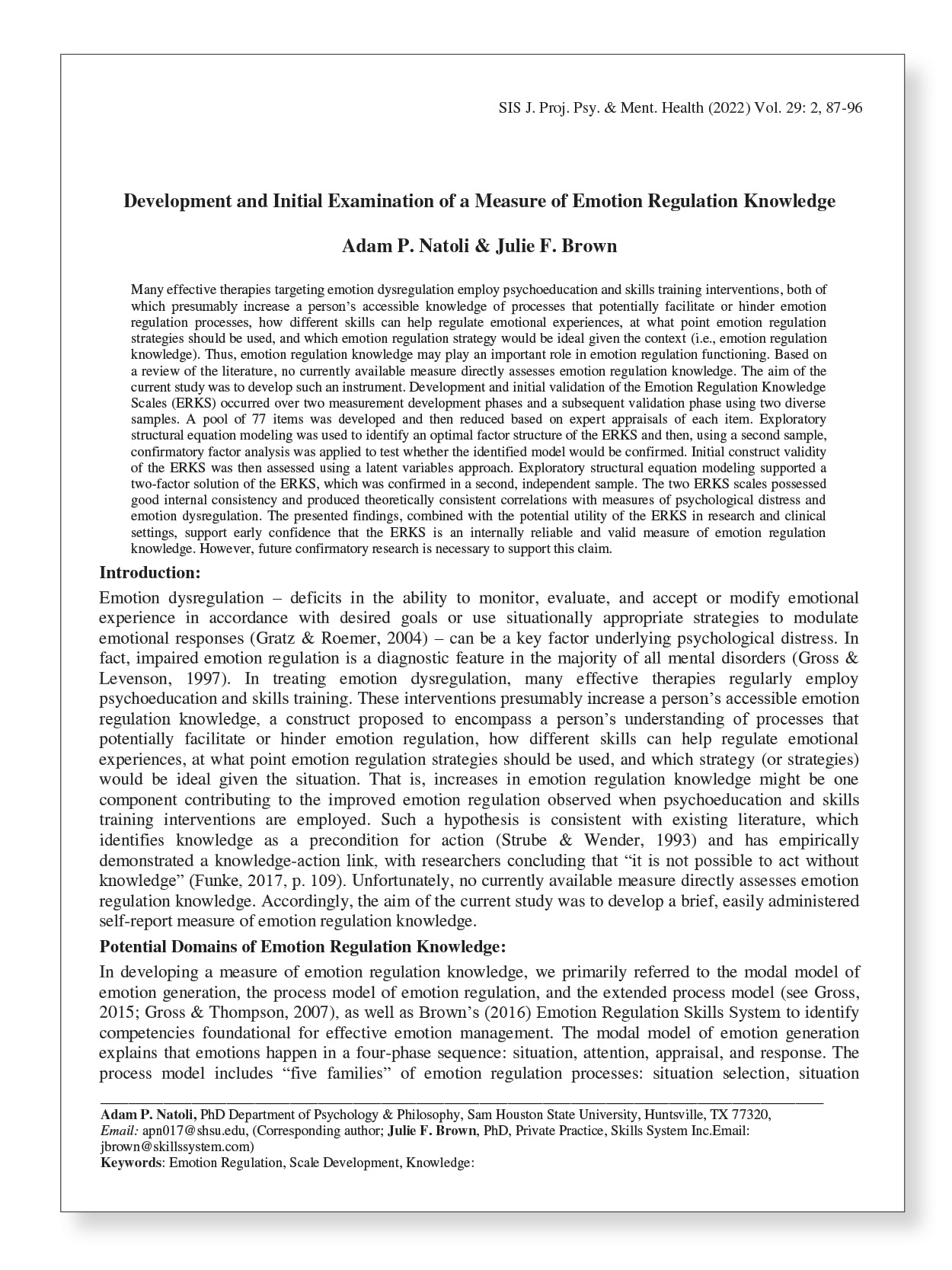The Skills System works to produce and support both books and peer review journal articles (on open access) that focus on improving the availability and access to psychologically-based therapeutic supports for individuals with complex learning and behavioral health needs. Our program engages in and supports outside teams conducting both quantitative and qualitative research.
Books
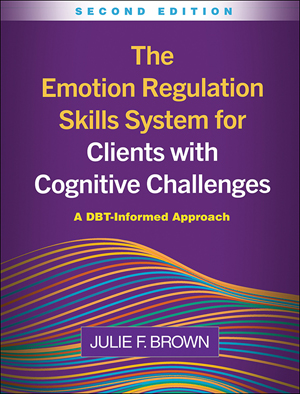
NEW! The Emotion Regulation Skills System for Clients with Cognitive Challenges
Second Edition (2026)
A DBT-Informed Approach
Julie F. Brown
Now in a fully revised second edition, this authoritative manual presents the only dialectical behavior therapy (DBT) informed approach designed specifically for people of all ages with learning and mental health challenges. Used in a wide range of clinical and community settings, the Skills System teaches essential emotion regulation and adaptive coping skills in a motivating, structured framework. It allows clinicians to provide comprehensive treatment for individuals who have had difficulty engaging in traditional therapeutic services. In a convenient large-size format, the manual features ideas for scaffolding learning, a sample 12-week group curriculum, and practical tools, including a reproducible/downloadable lesson planning worksheet. Client handouts and worksheets are not included in the second edition, but are provided in the companion workbook designed to optimize client learning, available separately in print or fillable e-book formats: The Emotion Regulation Skills System Workbook, Second Edition.
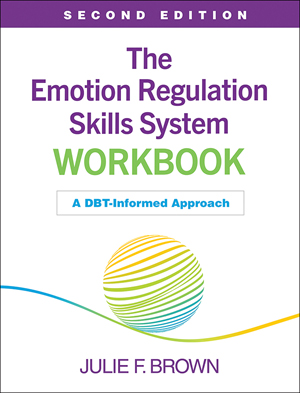
NEW! The Emotion Regulation Skills System Workbook
Second Edition (2026)
A DBT-Informed Approach
Julie F. Brown
In a convenient large-size format, this user-friendly workbook gives Skills System participants a wealth of tools for learning how to manage feelings, navigate the ups and downs of life, and reach goals. Designed for learners of all ages and abilities, the volume includes nearly 200 reproducible handouts and worksheets, though not all of them are used in every skills program. The Skills System is grounded in dialectical behavior therapy (DBT), a proven approach that has helped millions of people around the world cope with complex mental health difficulties and build a life worth living. Worked examples show how to fill out the worksheets for adults; the companion website provides worked examples for elementary and high-school age youth. Note: The e-book edition of this title contains fillable versions of the reproducible tools.
Mental health professionals, see also the authoritative manual: The Emotion Regulation Skills System for Clients with Cognitive Challenges, Second Edition.
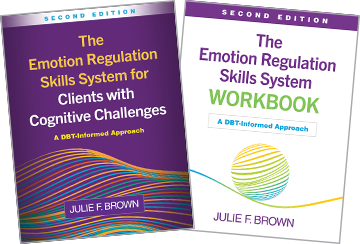
NEW! Skills System Textbook + Workbook
Second Edition (2026)
Order Together and Save
Special package offer: The Emotion Regulation Skills System for Clients with Cognitive Challenges, Second Edition, is the authoritative Skills System manual for professionals. The Emotion Regulation Skills System Workbook, Second Edition, is written expressly for clients.

An updated version, The Emotion Regulation Skills System: A DBT™-Informed Approach was published in 2016.
Informed by the principles and practices of dialectical behavior therapy (DBT), this book presents skills training guidelines specifically designed for adults with cognitive challenges. Clinicians learn how to teach core emotion regulation and adaptive coping skills in a framework that promotes motivation and mastery for all learners, and that helps clients apply what they have learned in daily life. The book features ideas for scaffolding learning, a sample 12-week group curriculum that can also be used in individual skills training, and numerous practical tools, including 150 reproducible handouts and worksheets. The large-size format facilitates photocopying. Purchasers also get access to a Web page where they can download and print the reproducible materials.
NEW MEASURE: Emotion Regulation Knowledge Scale (ERKS)
Journal: Journal of Projective Psychology and Mental Health (2022) Vol. 29: 87-96
Title: Development and Initial Examination of a Measure of Emotion Regulation Knowledge
Authors: Adam P. Natoli and Julie F. Brown
Abstract:
Many effective therapies targeting dysregulation employ psychoeducational and skills training interventions, both of which presumably increase a person’s accessible knowledge of processes that potentially facilitate or hinder emotion regulation processes, how different skills can help regulate emotional experiences, at what point emotion regulation strategies should be used, and which emotion regulation strategy would be ideal given the context (i.e., emotion regulation knowledge). Thus, emotion regulation knowledge may play an important role in emotion regulation functioning. Based on a review of literature, no current available measure directly assesses emotion regulation knowledge. The aim of the current study was to develop such an instrument. Development and initial validation of the Emotion Regulation Knowledge Scale (ERKS) occurred over two measurement development phases and a subsequent validation phase using two diverse samples. A pool of 77 items was developed and then reduced based on expert appraisals of each item. Exploratory structural equation modeling was used to identify an optimal factor structure of the ERKS and then, using a second sample, confirmatory factor analysis was applied to test whether the identified model would be confirmed. Initial construct validity of the ERKS was then assessed using a latent variable approach. Exploratory structural equation modeling supported a good internal consistency and produced theoretically consistent correlations with measures of psychological distress and emotional dysregulation. The presented findings, combined with the potential utility of the ERKS in research and clinical settings, support early confidence that the ERKS is an internally reliable and valid measure of emotion regulation knowledge. However, future confirmatory research is necessary to support this claim.
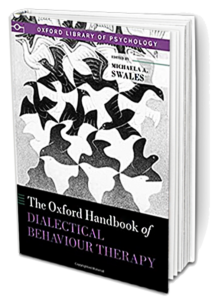
The Oxford Handbook of DBT (edited by Michaela Swales) Book Chapter “Improving Accessibility to Dialectical Behavior Therapy for Individuals with Cognitive Challenges” by Julie Brown, PhD.
Individuals with intellectual disabilities (ID) experience heighten vulnerabilities related to complex biopsychosocial factors, yet have limited access to comprehensive psychologically-based treatments to address these pervasive problems. Dr. Brown, a DBT trainer with Behavioral Tech, LLC- Linehan Institute, was invited to write a book chapter about how to adapt DBT for individuals with ID. Dr. Brown was given permission to share this work with the stipulation that the following phrase be noted on the document: “This is a draft of a chapter that has been accepted for publication by Oxford University Press in the forthcoming book The Oxford Handbook of DBT edited by Michaela Swales due for publication in 2019”. It is important that practitioners have this information to help improve access to DBT for this under-served population.

The Skills System Instructor’s Guide: An Emotion Regulation Skills Curriculum for All Learning Abilities, in 2011.
Having the capacity to benefit from emotions, rather than being paralyzed by them, offers people the opportunity to navigate difficulties, while being able to face life, relationships, and themselves with courage, grace, and strength. In The Skills System Instructor’s Guide, author Julie F. Brown provides a curriculum for helping people improve emotion regulation capacities, which allows the person to actively participate in both joyful and challenging aspects of life.
The guide presents nine simple, user-friendly adaptive coping skills effective for individuals of diverse learning abilities. Based on Dialectic Behavior Therapy principles, the Skills System helps people of all ages learn to effectively regulate emotions, thoughts, and actions to reach personal goals.
Peer Reviewed Journal Articles

Beyond the Surface of Consumer-Staff Relationships
Brown, J.B., Hamilton-Mason, J., Maramaldi, P., & Barnhill, L.J. (2018)
Global Journal of Intellectual & Developmental Disabilities, 4(4), 1-6.
Abstract:
The perspectives of individuals diagnosed with an intellectual disability and mental illness who demonstrate challenging behaviors are underrepresented in the literature. The goal of this study was to explore the perspectives of consumers with a dual-diagnosis on their relationships with staff. This qualitative constructivist grounded theory study included 30 individuals with mild or moderate intellectual disabilities, at least one co-occurring mental health diagnosis, and a history of challenging behaviors. Participants attended one of five 90-minute focus groups that addressed the topic of relationships; this analysis focused on disclosures that referenced consumer-staff relationships. Consumers appeared to experience positive consumer-staff relationship processes when staff relationships were supportive, close, fostered personal growth, included reciprocity, generosity, preferred traits, and helped the consumer engage in activities. Negative processes included staff exerting power differentials, being too directive, rushing or delaying, and invading privacy. In approximately half of descriptions of negative relationship processes, consumers described engaging in “synthesis processes” (i.e., adaptive coping, conflict resolution, and integrating positive and negative perspectives about staff) that appeared to shift their perceptions about their relationships with staff from negative to more positive. The implications of the findings in relation to what could be taught to staff and individuals with intellectual disabilities are discussed.

Communication Crossroads
Julie F. Brown, Johnnie Hamilton-Mason, Peter Maramaldi & L. Jarrett Barnhill
School of Social Work
Simmons College
Department of Psychiatry
University of North Carolina
Introduction:
Brown et al. [1] conducted a constructivist grounded theory qualitative study that examined perspectives of individuals with dual-diagnosis and histories of challenging behaviors (CB) about their family relationships. The original study included thirty individuals diagnosed with:
a. Moderate or mild intellectual disability (ID).
b. Comorbid mental health issues, and
c. Histories of CBs who were divided into five focus groups to discuss their perceptions about relationships.
This review will present observations about how intra-group communication patterns impacted the demonstration of cognitive strengths by participants in the focus group setting.

Intellectual Disabilities and Histories of Challenging Behaviors about Family Relationships: An Emergent Topic in a Grounded Theory Focus Group Study
Julie F. Brown, Johnnie Hamilton-Mason, Peter Maramaldi & L. Jarrett Barnhill
Justice Resource Institute–Integrated Clinical Service
Warwick, Rhode Island
School of Social Work
Simmons College
Department of Psychiatry
University of North Carolina
Abstract:
The perspectives of individuals with intellectual disabilities (ID) about family relationships are underrepresented in the literature. The topic of family relationships emerged in a grounded theory exploratory focus group study that involved thirty dually diagnosed participants with moderate or mild intellectual disabilities and histories of challenging behaviors. Because of the dearth of existing information and the salience of the topic, this analysis explored properties of the participant’s disclosures associated with family relationships. The aims were to offer treatment providers empirically based information that may inform service provision and increase the availability of ID-specific, psychological supports for dually diagnosed individuals. Participants reported different types and statuses of family relationships. Transactional processes described in positive family relationships included properties such as reciprocity, flexibility, accommodation, trusting, and expressing affection. Conversely, participants described transactional relationship barriers (e.g., victimizing, behavioral dyscontrol, and substance abuse) that involved dysregulated behaviors of both the participants and family members in conflicted and severed family relationships. These factors appeared to lead to co-dysregulation versus co-regulation within the family relationships. These findings are relevant given the consensus in the literature that environmental factors are associated with challenging behaviors. Not only do treatment providers need to understand potential family relationship patterns to provide individual supports, but these multilayered factors may warrant seeking additional treatment modalities that address emotion regulation deficits of the participants and family members, trauma-informed treatment, and family therapy. Additionally, conceptualizing family relationships as transactional may help families and collateral supports co-construct positive, collaborative transactions with dually diagnosed individuals that improve the quality of life of all involved.

Treating Individuals with Intellectual Disabilities and Challenging Behaviors With Adapted Dialectical Behavior Therapy
Brown, J. F., Brown, M.Z., & Dibiasio, P. (2013). Treating individuals with intellectual disabilities and challenging behaviors with adapted dialectical behavior therapy. Journal of Mental Health Research in Intellectual Disabilities, 6(4), 280-303.
Julie F. Brown
Skills System at Justice Resource Institute
Warwick, Rhode Island
Milton Z. Brown
Department of Psychology
Alliant International University
Paige Dibiasio
Justice Resource Institute, Supports to Empower People (STEP)
Cranston, Rhode Island
Abstract:
Approximately one third of adults with intellectual and developmental disabilities have emotion dysregulation and challenging behaviors (CBs). Although research has not yet confirmed that existing treatments adequately reduce CBs in this population, dialectical behavior therapy (DBT) holds promise, as it has been shown to effectively reduce CBs in other emotionally dysregulated populations. This longitudinal single-group pilot study examined whether individuals with impaired intellectual functioning would show reductions in CBs while receiving standard DBT individual therapy used in conjunction with the Skills System (DBT-SS), a DBT emotion regulation skills curriculum adapted for individuals with cognitive impairment. Forty adults with developmental disabilities (most of whom also had intellectual disabilities) and CBs, including histories of aggression, self-injury, sexual offending, or other CBs, participated in this study. Changes in their behaviors were monitored over 4 years while in DBT-SS. Large reductions in CBs were observed during the 4 years. These findings suggest that modified DBT holds promise for effectively treating individuals with intellectual and developmental disabilities.

